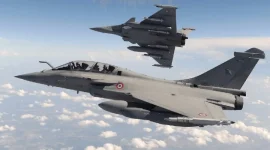
In a move to further decolonize the Indian military and instill a stronger sense of national identity, the Armed Forces are undergoing a significant transformation. This initiative involves a shift towards embracing indigenous military strategies and traditions, moving away from colonial-era practices.
One of the key changes is the incorporation of ancient Indian military wisdom into the curriculum for officers.
Instead of solely focusing on Western military thinkers, texts by Indian strategists like Chandragupta Maurya, along with studies of the Maratha and Sikh military campaigns, are being included in training programs.
This initiative is spearheaded by the College of Defence Management in Secunderabad, in collaboration with the Indic Studies department of Gujarat University. The aim is to foster a deeper understanding of India's rich military heritage and incorporate those lessons into modern strategic thinking.
The Navy is also looking inwards, drawing inspiration from the maritime prowess of historical figures like Raja Raja Chola I, his son Rajendra Chola, King Marthand Varma, and Kunjali Marakkar IV. Their naval strategies and achievements are being studied to inform contemporary maritime doctrines.
Beyond the curriculum, the Armed Forces are actively working to dismantle remnants of the colonial past. This includes streamlining the legal framework by replacing the three separate service Acts (for the Army, Navy, and Air Force) with a unified tri-service Act. This move is expected to enhance operational efficiency and reduce redundancies.
The Army is also considering reducing the number of Scottish-origin pipe bands, a vestige of the British Raj, to one per regional command headquarters.
These bands would primarily serve ceremonial purposes. Furthermore, discussions are underway to explore giving infantry regiments a more pan-India character, similar to the artillery and armored divisions, potentially moving away from the current regimental system based on ethnicity and region.
These changes are not isolated incidents but part of a broader, ongoing effort to "Indianize" the military. In recent years, several colonial-era customs and practices have been phased out.
This includes redesigning unit crests and the naval ensign, assigning Indian names to military platforms and weaponry, and incorporating more Indian tunes and instruments into ceremonies like the Republic Day parade and Beating Retreat.
The Christian hymn "Abide With Me" was notably replaced with the patriotic Hindi song "Ae Mere Watan Ke Logon" in the 2022 Beating Retreat ceremony. Joint exercises with other nations, military operations, and even seminar halls within military complexes are increasingly being assigned Indian names.
This push for indigenization gained momentum following Prime Minister Narendra Modi's call for increased self-reliance in the national security system during the Combined Commanders Conference in 2021. The current initiatives reflect a conscious effort to decolonize the military and instill a stronger sense of national pride and identity within the Armed Forces.




